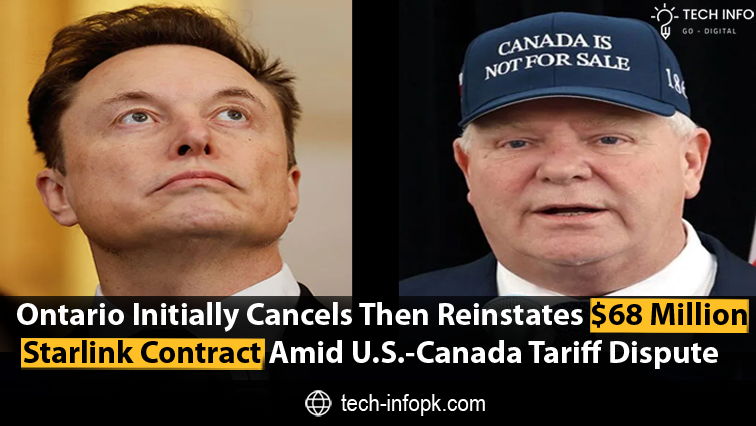Table of Contents
ToggleOntario Government Star link Contract Faces Uncertainty
In a dramatic turn of events, the government of Ontario, one of Canada’s largest provinces, initially announced the termination of its $68 million ($100 million CAD) contract with Starlink, Elon Musk’s satellite internet service. The decision, revealed by Ontario Premier Doug Ford on X (formerly Twitter), was a direct response to newly imposed U.S. tariffs on Canadian imports. However, within hours, the province reversed its stance following a temporary delay in the enforcement of those tariffs by U.S. President Donald Trump.
Tariff Disputes Spark Policy Changes in Ontario
The conflict began when President Trump declared a 25% tariff on nearly all Canadian imports, prompting the Canadian government to retaliate with a matching 25% tariff on U.S. goods. The economic standoff threatened trade relations and affected several cross-border contracts, including Ontario’s agreement with Starlink. Initially, Premier Ford condemned the tariffs and announced that Ontario would ban all future contracts with U.S.-based companies until the restrictions were lifted. The Starlink deal, signed in November 2024, was intended to provide high-speed internet access to remote and underserved communities across the province.
However, Ford’s government reconsidered its position later that same day after President Trump decided to postpone the tariffs for 30 days. The delay followed concessions from Canadian Prime Minister Justin Trudeau, who committed to deploying 10,000 “frontline personnel” along the Canada-U.S. border to enhance security and trade oversight.
Musk’s Growing Political Influence and Starlink Government
Elon Musk, an influential business magnate and close ally of President Trump, has gained significant political influence through his role overseeing the newly established Department of Government Efficiency (DOGE). This unit within the Trump administration is dedicated to extensive cost-cutting measures and broad deregulation. Amid these policy shifts, Musk’s Starlink has aggressively pursued contracts with governments worldwide to provide satellite-based internet solutions, particularly in remote areas lacking reliable broadband infrastructure.
Despite the reversal of Ontario’s decision, Ford initially voiced strong opposition to Musk’s involvement in the tariff dispute. Speaking at a press conference, he criticized Musk for allegedly prioritizing U.S. economic interests over Canadian livelihoods.
“Ford asserted that Musk is a key figure within the Trump administration’s team, which he claims is responsible for undermining families, livelihoods, and businesses. “He wants to take food off the table of hardworking people, and I won’t tolerate it.”
Ford further emphasized that Ontario’s initial decision to sever the Starlink contract was a strategic move to push back against U.S. economic policies.
“As a result, U.S.-based companies are now set to forfeit tens of billions of dollars in potential revenue opportunities.”
The Broader Implications of Ontario’s Policy Shift
The temporary cancellation and subsequent reinstatement of Ontario’s Starlink contract highlight the delicate economic relationship between Canada and the United States. While Ontario initially sought to assert economic independence by banning American companies from provincial contracts, the rapid shift in policy demonstrates the high stakes of international trade negotiations. The controversy also underscores the significant role that corporate influence and political alliances play in shaping government decisions.
As the 30-day tariff delay unfolds, businesses and policymakers alike will be watching closely to see if the U.S. permanently retracts its tariff plans or if Canada and its provinces will need to take further retaliatory actions. For now, Ontario’s partnership with Starlink remains intact, but the situation serves as a stark reminder of how geopolitical tensions can directly impact local economies, industries, and public services.
Conclusion
The Ontario government’s handling of the Starlink contract amid rising trade tensions exemplifies the challenges of balancing political retaliation with technological progress. While Ford’s initial move to cancel the contract was a bold statement against U.S. tariffs, the subsequent reversal highlights the province’s reliance on innovative solutions like Starlink to bridge digital divides. As global economic policies continue to evolve, governments will need to navigate complex trade relationships while ensuring that critical infrastructure projects remain unaffected.
With the U.S. tariff decision still uncertain, the next few weeks will be pivotal in determining whether Ontario’s stance on U.S. business contracts will shift once again. For now, the province has reinstated its deal with Starlink, but the broader implications of these economic maneuvers are yet to be fully realized. One thing is clear: the intersection of trade policy, technology, and political strategy will continue to shape the future of international business agreements.





